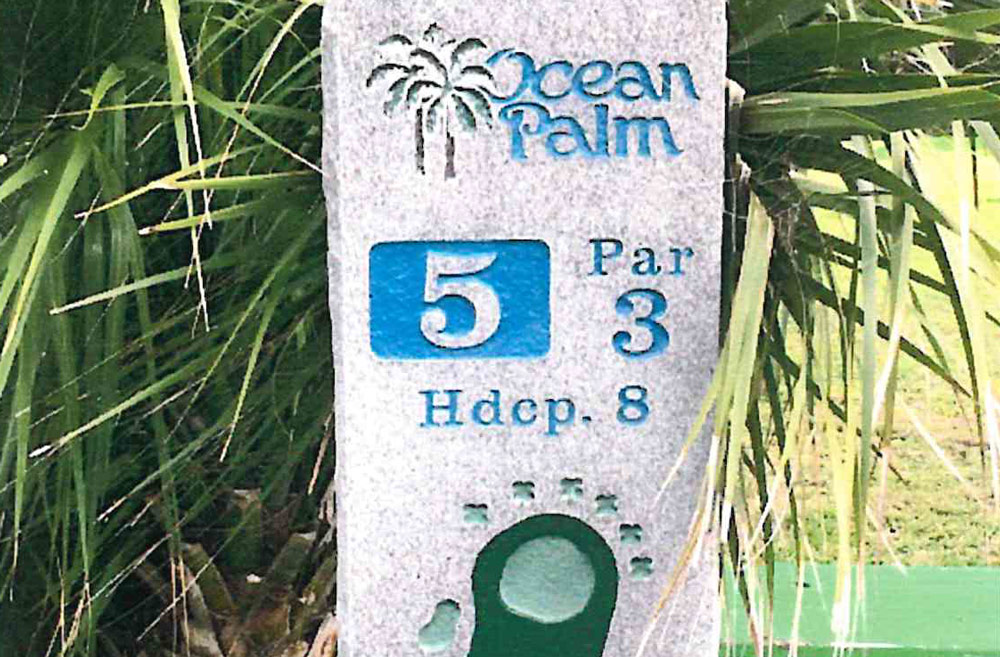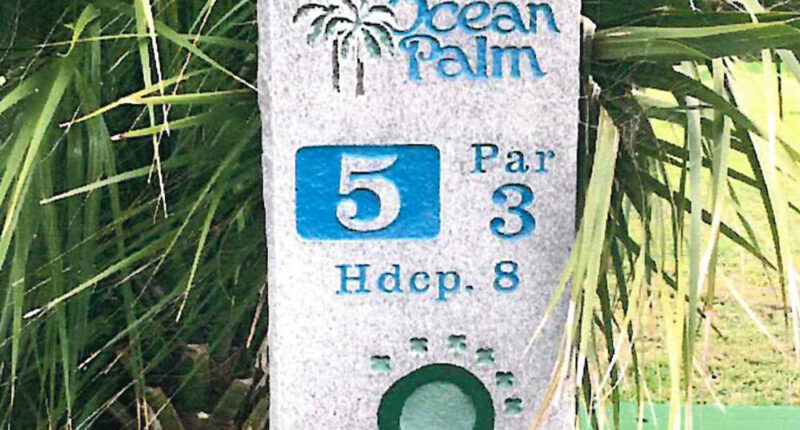
To more skepticism than support from residents, the Flagler Beach City Commission on Thursday voted 4-1 to enter into negotiations to sell its chronically ramshackle 37-acre Ocean Palm Golf Club to Jeff Ryan and a partner, who have held the property’s lease for over a year and a half.
The property may be deed-restricted. But a deed restriction is only as good as a commission’s vote. If the course is sold, there’s no guarantee against a future commission approving the land for development. It would only take a unanimous vote of the commission to do so.
Ryan in June sent the city a letter of intent to buy the run-down, nine-hole property. He and a partner, Tanuj Seoni, say they will invest $6 million to turn the property into an attractive 12-hole golf course with a 20,000 square-foot clubhouse. A resident questioned how the investors intended to make back that kind of money on a 12-hole course, saying the math doesn’t work.
“The obligation under a letter of intent is negotiating in good faith,” City Attorney Drew Smith said. That does not mean the commission has voted to sell the property. However downplayed, it is a significant step toward that end. “What you’re negotiating first is the purchase and sale agreement, which puts together the basic terms of what the ultimate sale is going to look like. Then you move to closing. That’s when the deed is on.”
The commission must first approve the sale agreement. That would be followed by due diligence, one of the steps that allow the commission to scrap the sale. Before closing, the commission will have to approve an ordinance ratifying the sale at two public hearings, both times giving the commission more chances to pull out.
The city conducted three appraisals that averaged $800,000. (They came in at $794,000, $810,000, and $800,000.)
“Our vision for Ocean Palm is really a USGA specifications-greens, modern irrigation, environmentally responsible upgrades,” Seoni told the city commission. Ryan was not at the meeting. “We want to have a welcoming clubhouse and offer community-first programs, bridge clubs, brunches, couples golf league play, whatever is needed will be designed to increase home value around the area.” He said “this is not a land flip or a speculation play. It’s about restoring a community-based asset and building something Flagler Beach can be proud of.”
“If this is this gentleman’s dream, where is he tonight?” Corey Montague of Ocean Palm Drive asked.
Other residents were also not so sure about Seoni’s promise. “We’ve talked about Jeff’s experience and the new era in golf,” Ryan Jones of Ocean Palms Drive, neighboring the course, said. “We haven’t seen proof of that, and I think that’s really the only reason I personally have heartburn with this project.” If Ryan had maintained the course better than he had, there may have been greater confidence in his claims that he would turn the course around.
A few residents are heartily behind the sale.
“I want the golf course sold,” one of the property owners on the rim of the course said. She’s lived on the golf course six years. “No city should be in the golf course business.” Chris Conklin, who also lives on the course, called the course “a disgrace” that is nothing like a golf course. “But we keep pushing back against a guy who has a dream,” he said.
Ideally for Ryan, Commissioner Scott Spradley said, he would buy the property, get financing and “he’s off and running. From the city’s point of view, what I’m getting from the residents, including those who would support a sale to the right owner, is: how do we ensure that the timeline is complied with? How do we ensure that we don’t wind up where we are presently, with a golf course that is at best, equal, if not worse, than what it was when the tenancy began? So I don’t know how benchmarks could be incorporated into an agreement if the sale occurs on the front end of that.”
“That is the dilemma,” Jay Livingston, Ryan’s attorney, said. “All I can tell you, from our perspective, is that they intend to move forward.” But he’s leaving it to “the creativity of the attorneys,” meaning himself and Smith, to hold the owner to his obligations. The commission may not be comfortable with that.
Smith immediately made clear why. “Once that deed is signed, you do not have a level of control,” Smith said. The most the deed could say–and that’ll be part of the negotiations–is that it would take a unanimous vote by the commission to abrogate the deed restriction, which is that the property should always be a golf course. The commission also could make the deed conditional on a certain amount of money invested,” Smith said, without explaining how those amounts would be defined or verified. If it’s not, the property would revert to the city.
City Commissioner John Cunningham, who voted against negotiating, is skeptical of losing ownership. “That’s what my concern is, that if we don’t own it, the city doesn’t own it, somebody else owns it. They could do whatever they want,” Cunningham said. “It could be 10 years, 20 years, whatever, down the line, and you’ll see a subdivision going in there. I’ve done it. I know it can be done.”
Livingston outlined the renovation plans according to an ambitious 28-week timeline, and said Ryan needs the sale to line up investors. The physical driving range would be replaced by a “digital driving range.”Existing retention ponds will be expanded. All irrigation will come out of one of the ponds on the site.
“If we did not at least open the door to have negotiations and understand some detail,” Spradley said, “then we’d be doing a disservice. In fact, not opening the door to negotiate, then would mean the opposite. Then we’re closing the door, and the city would stay in the golf course business, which of all the potential miserable failures you could imagine, that’s probably the biggest one.” He doesn’t see a downside to negotiating and sees a lot of upsides.
To Commissioner Rick Belhumeur, “I say stop the hemorrhaging. Ever since we bought this place, this cost us millions of dollars, maybe not multiple millions, but it cost us $950,000 just to buy the property,” he said. The city will not be making that money back, if it sells at the average of the appraisals. Belhumeur listed the sums the ciy spent on the course since 2008. “It’s cost us a lot of money, and it’s time to get out of it,” he said, sounding like some of the Palm Coast City Council members who want to sell Palm Harbor Golf Club for the same reason. “We can’t do it, but it’s been said by all of us up here that we failed miserably at it, and it’s time to bail. It’s just keeps costing us more and more money, and as long as we keep it, it’s going to keep costing us more money.”
Commission Chair James Sherman is behind Belhumeur.
Mark Imhoff, who has led the opposition to the sale, asked for a citywide survey to poll residents’ wishes. He cautioned the commissioners about the buyers’ background. He warned them that golf courses have been purchased only to be turned into development tracts–as was the case with the Matanzas Woods golf course in Palm Coast. Another resident questioned why Ryan entered into the lease in the first place if he wanted to buy the property, and how he squares the fact that he has no money now, but has “all kinds of investors” lined up to help should he buy it. She doesn’t see why the city would sell.
RJ Santore said selling the property is premature, preferring to renegotiate the lease rather than sell. “We don’t know what the next 20 years will bring to this island,” he said. “This could be very valuable property for the city.” But Doug Wilty, an A1A resident, said whatever complaints there may be about Ryan and permitting or lack of water at the course are not his fault. “We’ve got a chance to make this very nice golf course,” he said. “Give this man a chance to do it. He’s got good intentions. Look at the place right now. It’s a mess. You’ve got nothing to lose at this point.”










